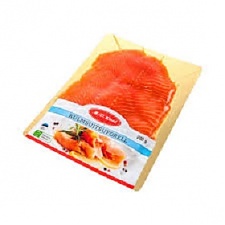Estonia, Foodstuff, Health, Legislation, Markets and Companies, Retail
International Internet Magazine. Baltic States news & analytics
Monday, 06.01.2025, 23:19
Estonia: M.V. Wool to recall trout gravlax from stores at request of veterinary authority
 Print version
Print version |
|---|
M.V. Wool will comply with the injunction immediately, though the company said that such a requirement does not originate from the Food Act or a regulation of the European Commission. The company will continue to consult with the Veterinary and Food Board to ensure compliance with the law, the company said.
According to M.V. Wool, crossing the 100 colony-forming units per gram (cfu/g) limit of listeria bacterium content must have been proven upon recalling a product from trade, the company said that this has not occurred at present. At the same time, the Veterinary and Food Board also took samples from retail, which according to M.V. Wool turned out to be clean.
"The injunction is based on a test carried out in the company on October 1, where one of the five sub-samples of 25 grams of the product showed listeria content, which the company also informed the public about. Previous test results from an independent accredited laboratory do not indicate listeria content in this product, nor do the results of a duplicate sample. However, we are required to comply immediately," Meelis Vetevool, chairman of the supervisory board of M.V. Wool, said.
At that the company claims that for the third time, listeria bacterium was found in M.V.Wool's product in a B sample taken in a laboratory of the Veterinary and Food Board, although no listeria bacterium was found in samples taken in two other accredited laboratories, that is A and C samples. No such discrepancies have been reported before June this year, the company said.
M.V. Wool has also assumed the stance that all fish products of the company have always complied with the maximum limits in force in the European Union and the harmful effects of these fish products on human health are ruled out.
"As the listeria bacterium is found everywhere in nature, fish farms do their best to check for the presence of the bacterium in the raw material. However, there is still the possibility that some bacteria may be present in some fish. That is why there are food safety criteria for raw fish products that allow a listeria bacterium content of up to 100 colony-forming units per gram," the company said.
Surveys conducted in several countries indicate that a very aggressive mutant of the listeria bacterium is present in the plant of M. V. Wool at Harku just outside Tallinn. According to available information, 26 people across Europe have been infected, six of whom have died between 2014 and 2018. In Estonia, nine people have been infected and two have died.
Genetic analyses commissioned by the Veterinary and Food Board have established that the aggressive and contagious listeria bacterium originates from the plant of M. V. Wool, the biggest fish processor in Estonia. Bacteria of that specific strain have been found both on the plant's premises as well as in infected persons.
Listeriosis can be contracted from eating contaminated food. The bacteria may be present in insufficiently processed meat, unpasteurized milk and cheese made thereof, fresh fruits and vegetables, and fish. Pregnant women and their fetuses, as well as newborns and children with weakened immune systems have an increased chance of getting the illness.








 «The Baltic Course» Is Sold and Stays in Business!
«The Baltic Course» Is Sold and Stays in Business!

